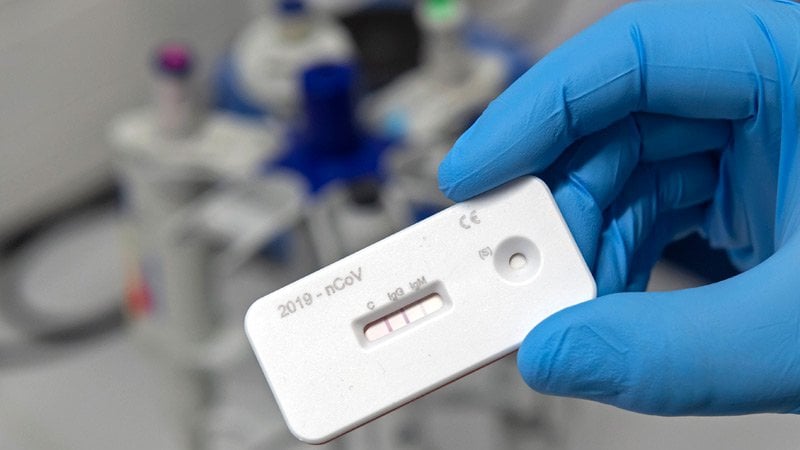Test for Past Infection (Antibody Test)
Antibody tests check your blood by looking for antibodies, which can show if you had a past infection with the virus that causes COVID-19. Antibodies are proteins that help fight off infections and usually provide protection against getting that disease again (immunity). Antibodies are disease specific. For example, measles antibody will protect a person who is exposed again to measles but will have no effect if the person is exposed to mumps.
Depending on when someone was infected and the timing of the test, the test may not find antibodies in someone with a current COVID-19 infection. Antibody tests should not be used to diagnose COVID-19. To see if you are currently infected, you need a viral test. Viral tests identify the virus in samples from your respiratory system, such as swabs from the inside of your nose.
If you test positive or negative for COVID-19 on a viral or an antibody test, you still should take preventive measures to protect yourself and others.
We do not know yet if people who recover from COVID-19 can get infected again. Scientists are working to understand this.

Self-Checker
A guide to help you make decisions and seek appropriate medical care.
How to get an COVID-19 Antibody Test
Antibody tests for COVID-19 are available through healthcare providers and laboratories. Check with your healthcare provider to see if they offer antibody tests and whether you should get one.
What do your results mean?
If you test positive
- A positive test result shows you may have antibodies from an infection with the virus that causes COVID-19, or possibly from infection with a related virus from the same family of viruses (called coronavirus), such as one that causes the common cold.
- We do not know yet if having antibodies to the virus that causes COVID-19 can protect someone from getting infected again or, if they do, how long this protection might last.
- Talk with your healthcare provider about your test result and the type of test you took to understand what your result means. Your provider may suggest you take a second type of antibody test to see if the first test was accurate.
- You should continue to protect yourself and others since it’s possible you could get infected with the virus again.
- If you have no symptoms, you likely do not have an active infection and no additional follow-up is needed.
-
- If you work in a job where you wear personal protective equipment (PPE), continue wearing PPE.
- If you have symptoms and meet other criteria for testing, you would need another type of test called a viral test. This test identifies the virus that causes COVID-19.
-
- This test uses respiratory samples, such as a swab from inside your nose, to confirm COVID-19.
- An antibody (blood) test cannot tell if you are currently sick with COVID-19.
- You might test positive for antibodies even if you never had symptoms of COVID-19. This can happen if you had an infection without symptoms (also called an asymptomatic infection).
If you test negative
- You may not have had COVID-19 before. Talk with your healthcare provider about your test result and the type of test you took to understand what your result means.
- You could still have a current infection.
-
- The test may be negative because it typically takes 1 to 3 weeks after infection to develop antibodies. It’s possible you could still get sick if you have been exposed to the virus recently. This means you could still spread the virus.
- Some people may take even longer to develop antibodies, and some people may not develop antibodies.
- If you have symptoms or develop symptoms after the antibody test and you meet other criteria for testing, you would need another type of test called a viral test. This test uses respiratory samples, such as a swab from inside your nose, to confirm COVID-19. An antibody (blood) test cannot tell if you are currently sick with COVID-19.
Regardless of whether you test positive or negative, the results do not confirm whether or not you are able to spread the virus that causes COVID-19. Until we know more, continue to take steps to protect yourself and others.Learn more about using antibody tests to look for past infection.
CDC is evaluating commercial antibody tests
CDC is collaborating with other government agencies to evaluate the performance of commercially manufactured antibody tests. Some of these tests have received Emergency Use Authorization from the U.S. Food and Drug Administration (FDA)
CDC is conducting serologic surveillance
CDC is looking at data from antibody tests to estimate the total number of people who have been infected with the virus that causes COVID-19 in the United States. CDC is also using antibody testing to learn more about how the body’s immune system responds to the virus and to explore how the virus spreads among people exposed to it. The information CDC is looking at comes from many groups, including blood donors and household contacts of people who had symptoms and were diagnosed with COVID-19.
Readmore: Using Antibody Tests for COVID-19